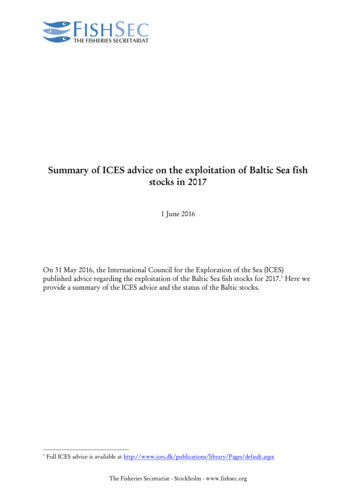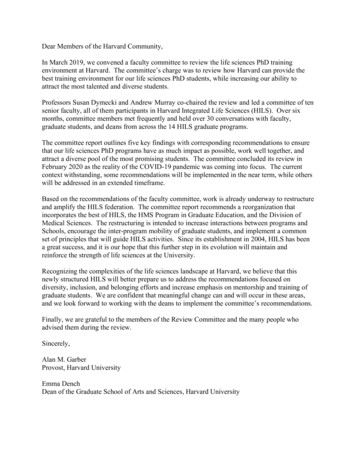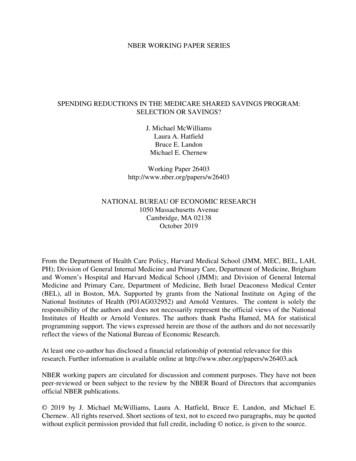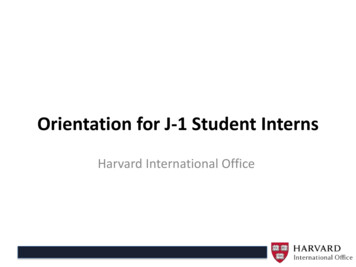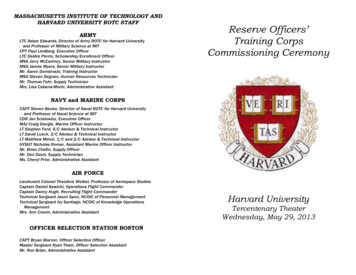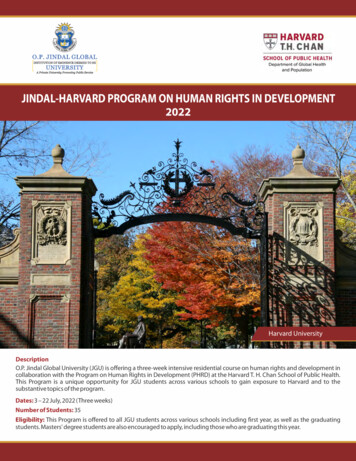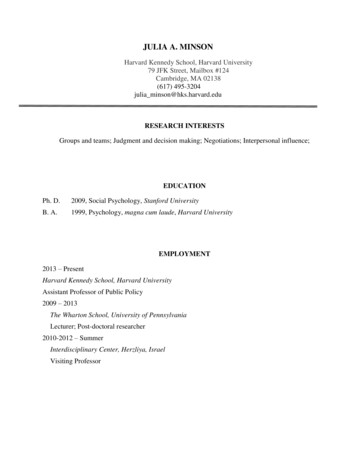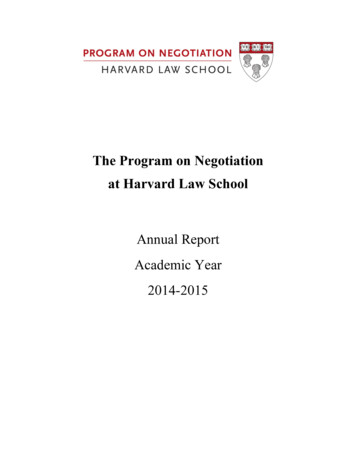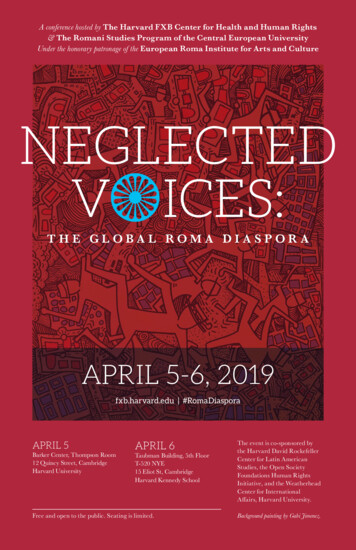
Transcription
A conference hosted by The Harvard FXB Center for Health and Human Rights& The Romani Studies Program of the Central European UniversityUnder the honorary patronage of the European Roma Institute for Arts and CultureNEGLECTEDV ICES:THE GLOBAL ROMA DIASPOR AAPRIL 5-6, 2019fxb.harvard.edu #RomaDiasporaAPRIL 5Barker Center, Thompson Room12 Quincy Street, CambridgeHarvard UniversityAPRIL 6Taubman Building, 5th FloorT-520 NYE15 Eliot St, CambridgeHarvard Kennedy SchoolFree and open to the public. Seating is limited.The event is co-sponsored bythe Harvard David RockefellerCenter for Latin AmericanStudies, the Open SocietyFoundations Human RightsInitiative, and the WeatherheadCenter for InternationalAffairs, Harvard University.Background painting by Gabi Jimenez.
The “Neglected Voices: The Global Roma Diaspora”conference is hosted by the Harvard FXB Centerfor Health and Human Rights and the RomaniStudies Program of the Central European University.The Harvard FXB Center has organized an event onInternational Roma Day for the past six years. Previousevents have centered on questions of discrimination,exposure to violence, stigma, and marginalization, Romarepresentations in arts, culture, and literature, and solidaritybetween Romani and African American communities.This year, we add a new and so far ignored perspectiveto ongoing debates by initiating a conversation on thecomplexity and variety of the global Romani diaspora.A medium-term goal is to use the conference as a launch padfor a sustained investigation into the complexity and varietyof the Romani diaspora across the world. We also hope tohelp mobilize solidarity and cooperation between Romaniactivists, scholars, and communities across continents.The event is co-sponsored by the Harvard David RockefellerCenter for Latin American Studies, the WeatherheadCenter for International Affairs at Harvard, and theOpen Society Foundations Human Rights Initiative.The conference takes place under the honorary patronageof the European Roma Institute for Arts and Culture.
APRIL 5, 2019Thompson Room, Barker Center, Harvard University9:00 amWelcome Address9:15 amIntroductory Panel10:30 amPanel 112:30 pmLunch Break1:30 pmPanel 23:30 pmMary Bassett, Director, Harvard FXB Center for Health and Human RightsMichèle Lamont, Director, Weatherhead Center for International Affairs, Harvard UniversityLiviu Matei, Provost, Central European University (video)THE HUMAN RIGHTS SITUATION OF ROMA WORLDWIDEChair Jacqueline Bhabha, Director of Research,Harvard FXB Center for Health and Human RightsPresenter Margareta Matache, Director of the Roma Program andInstructor, Harvard FXB Center for Health and Human RightsKeynote Speaker Rita Izsák-Ndiaye, Member of the United Nations Committee on theElimination of Racial Discrimination; Former UN Special Rapporteur on Minority IssuesDiscussant Fredrik von Bothmer, United Nations Office of the Special Adviserson the Prevention of Genocide and the Responsibility to ProtectSOCIAL AND ECONOMIC STATUS OF ROMA ACROSS THE WORLD:ACCESS TO FUNDAMENTAL RIGHTSChair Mary Bassett, Director, Harvard FXB Center for Health and Human RightsPresenter Alexandra Oprea, Romani attorney, author, and activist, USAPresenter Kristin Raeesi, Board Member, Voice of Roma, USAPresenter Luciano Mariz Maia, Deputy Prosecutor-General and Professor, BrazilPresenter Dafina Savic, Executive Director of Romanipe Montreal, CanadaPresenter Timea Junghaus, Executive Director of the EuropeanRoma Institute for Arts and Culture, GermanyDiscussant Belen Rodriguez de Alba, Human Rights Officer, Indigenous Peoples, andMinorities Section, Office of the United Nations High Commissioner for Human RightsTHE DISPARATE MANIFESTATIONS OF STIGMA AGAINST ROMAIN THE AMERICAS AND EUROPEChair Sunil Amrith, Mehra Family Professor of South Asian Studiesand Professor of History, Harvard UniversityPresenter Iulius Rostas, Chair of the Romani Studies Program andAssistant Professor, Central European University, HungaryPresenter Angéla Kóczé, Assistant Professor of Romani Studies and Academic Director ofthe Roma Graduate Preparation Program, Central European University, HungaryPresenter Victoria Rios, Singer/songwriter, music teacher, and Romani activist, USAPresenter Aline Miklos, Doctoral Art History Student, University of São Paulo, BrazilPresenter Lela Savic, Journalist, CanadaDiscussant Michèle Lamont, Director, Weatherhead Centerfor International Affairs, Harvard UniversityBreakApril 5-6, 20193
Panel 34:00 pmWHAT MAKES A DIASPORA? THE CASE OF THE GLOBAL ROMANI DIASPORAChair Kay Kaufman Shelemay, G. Gordon Watts Professor of Music andProfessor of African and African American Studies, Harvard UniversityPresenter Khachig Tölölyan, Professor, Wesleyan University, USAPresenter Ethel Brooks, Associate Professor of Women’s andGender Studies and Sociology, Rutgers University, USAPresenter Marcos Toyansk Silva Guimarais, Researcher and group leader,University of São Paulo, BrazilPresenter Ismael Cortes, Lecturer at the UNESCO Chair of Philosophy,Universitat Jaume I de Castelló;Presenter Petra Gelbart, Curator of the Music Section at RomArchive;Lecturer, Ramapo College New Jersey, USADiscussant Aurora Vergara Figueroa, Assistant Professor of Sociology andDirector of the Afrodiasporic Studies Center at Universidad Icesi in Cali, ColombiaConcluding Remarks6:00 pmJacqueline Bhabha, Director of Research, Harvard FXB Center for Health and Human RightsAPRIL 6, 2019Harvard Kennedy School, Taubman Building,5th Floor, T-520 NYEPanel Discussion9:00 amORGANIZING AND MOBILIZING ROMA: TACTICS; FAILURES; OPPORTUNITIES;LESSONS LEARNED FROM THE AFRODESCENDANT MOVEMENT IN LATINAMERICA; STEPS FORWARD.Chair Iulius Rostas, Chair of the Romani Studies Program andAssistant Professor, Central European University, HungaryDiscussant Aurora Vergara Figueroa, Assistant Professor of Sociology andDirector of the Afrodiasporic Studies Center at Universidad Icesi in Cali, ColombiaContributor Radu Marian, Member of Parliament, Republic of MoldovaContributor Anina Ciuciu, President, ASET93; Board Member La Voix des Rroms, FranceContributor George Eli, Filmmaker, spiritualist, and founder of the Romani Media Initiative, USAContributor Ana Dalila Gómez Baos, General coordinator of the Organizational Processof the Rrom Gitano people of Colombia, Colombia10:45 amCoffee Break11:00 amPanel Discussion continues12:30 pm4Contributor Ariadyne Acunha, the International Association Maylê Sara Kalí - AMSK/BrazilContributor Tanja Jovanovic, Post-Doctoral Fellow, Central European University and Harvard;Policy Officer, Justice Initiative, Open Society Foundation, LondonContributor Zoran Bikovski, Health Program Coordinator, NGO KHAM Delchevo, MacedoniaContributor Carol Silverman, Professor of Anthropology/Folklore and Public Culture,University of Oregon; Board Member, Voice of Roma, USALunchNEGLECTED VOICES: The Global Roma Diaspora
ARIADYNE ACUNHA works withAssociação Internacional Maylê SaraKalí in Brazil as a youth expert.Ariandyne was the co-founder of theBrazilian Youth Coalition, anorganization that works on the implementation of theSustainable Development Goals (SDGs). She alsoworked as a coordinator of international affairs forseveral Brazilian NGOs. As a representative ofBrazilian children & youth at the United Nations, sheis responsible for the engagement of Latin Americanand the Caribbean youth in government processes.She has been working for more than ten years in thefield of child rights, especially with children and youthin traditional communities as well as Roma youth.SUNIL AMRITH is the MehraFamily Professor of South AsianStudies at Harvard University.His research is on the trans-nationalmovement of people, ideas, andinstitutions. Areas of particular interest include thehistory of public health and poverty, the history ofmigration, and environmental history. His most recentwork has been on the Bay of Bengal as a regionconnecting South and Southeast Asia. He has a Ph.D.in History (2005) from the University of Cambridge,where has was also a Research Fellow of TrinityCollege (2004-6).ANA DALILA GÓMEZ BAOS is aRomani activist from the Kumpaniaof Bogotá-Colombia. She is anindustrial engineer, lawyer, andspecialist in management andplanning. Ana Dalila is also the general coordinator ofthe Organizational Process of the Rrom Gitanopeople of Colombia PRORROM and a member ofdifferent international networks and organizationsaround the world. She has fought for the Romainclusion in national and international politicalagendas and advocated for the inclusion of thevariable “Roma” in the 2005 general census. AnaDalila contributed to the development of a regulatoryframework in Colombia that takes account of therights of the Roma people.DR. MARY T. BASSETT is theDirector of the Harvard FXB Centerfor Health and Human Rights andthe FXB Professor of the Practice ofHealth and Human Rights. Withmore than 30 years of experience in public health,Dr. Bassett has dedicated her career to advancinghealth equity. Prior to joining the FXB Center, sheserved as New York City’s Commissioner of Healthfrom 2014 to 2018. Originally from New York City,Dr. Bassett lived in Zimbabwe for nearly 20 years,where she served on the medical faculty of theUniversity of Zimbabwe. She has also worked for theRockefeller Foundation and the Doris DukeCharitable Foundation. In 2017 she was elected amember of the National Academy of Medicine.JACQUELINE BHABHA is theDirector of Research at the HarvardFXB Center for Health and HumanRights, Professor of the Practice ofHealth and Human Rights at theHarvard School of Public Health, the Jeremiah SmithJr. Lecturer in Law at Harvard Law School, and anAdjunct Lecturer in Public Policy at the HarvardKennedy School. From 1997 to 2001, Bhabhadirected the Human Rights Program at the Universityof Chicago. Before 1997, she was a practicing humanrights lawyer in London and at the European Court ofHuman Rights in Strasbourg. She has publishedextensively on issues of transnational child migration,refugee protection, children’s rights, and citizenship.Bhabha co-chairs Harvard’s Scholars at Risk Programand is the former and founding chair of the Scholarsat Risk Network. She serves on the board of the WorldPeace Foundation and the Journal of Refugee Studiesand is a frequent adviser to UNHCR, UNICEF, IOMand civil society organizations working on forcedmigration-related issues.ZORAN BIKOVSKI is a sociologistwith 17 years of experience in theRoma NGO sector. Zoran has workedboth a researcher and as apractitioner, working directly withRoma communities. Since 2011, he has been theProgram Health Coordinator in the NGO “KHAM”Delcevo, responsible for the implementation of theprogram of Legal Empowerment and SocialAccountability. His work and the work of the NGO“KHAM” team have visible results in advocacy on thelocal and national levels. From 2014 to 2017, he wasthe President of Macedonian Platform againstPoverty, which included 97 NGOs. Since February2015, he has been a social accountability mentor forRomanian and Bulgarian NGOs. As a practitioner, heis very connected with Romani communities andleaders, giving him the opportunity to strengthencommunities and advocate for the advancement of therights of the marginalized Roma.April 5-6, 20195
FREDRIK VON BOTHMERworks with the United Nations Officeon Genocide Prevention and theResponsibility to Protect in Europe,Latin America, and the Middle East.He supports the Under-Secretary-General AdamaDieng in assessing the risk of atrocity crimes as well asin developing atrocity prevention capacities andstrategies. Prior, Fred worked in disarmament,demobilization, and reintegration of armed groups forthe UN Mission in the Democratic Republic of theCongo; at the Institute for Public International Law inMunich, the UN Division of the German ForeignOffice in Berlin; at the Human Rights Council for thePermanent Mission of Germany to the UN inGeneva; as well as for the Office of the UN HighCommissioner for Human Rights in Geneva. Heholds a Ph.D. from the University of St. Gallen, anLL.M. from The Fletcher School of Law andDiplomacy and a JD from the University of Munich.ETHEL BROOKS is AssociateProfessor of Women’s and GenderStudies and Sociology at RutgersUniversity and a Tate-TrAINTransnational Fellow at the Universityof the Arts London, where she was the US-UKFulbright Distinguished Chair (2011-2012). Brooks isa member of the United States Holocaust MemorialCouncil, Chair of the Board of the European RomaRights Centre, and member of the BavarlipeAcademy of the European Roma Institute for Artsand Culture. She has served on the US Delegation tothe Human Dimension Implementation Meetings ofthe OSCE and spoke in the General Assembly for theUnited Nations Holocaust Remembrance Ceremony.Since 2007, Brooks has co-directed the Feminist CriticalAnalysis course in Dubrovnik, and since 2015, theSummer University course on Romani Studies atCEU. Brooks is the author of the award-winningUnraveling the Garment Industry: Transnational Organizingand Women’s Work.ANINA CIUCIU is a young lawyerand author, a French and Romaniancitizen of Romani origin. In 2013,she published “I’m Roma, and Iremain,” a book that told her ownstory: a Romani child living in a Europe full of hate,police brutality, and discrimination and who escapedfrom the poverty of slums to enter the SorbonneUniversity. Her book has been translated intoRomanian and Italian. She became a model role.She is active in several NGOs, including “The Voiceof Roma,” “ASET 93,” the “May 16th Movement.”In September 2017, she was the first Romani personin the French history running for national election(Senate). She is currently the coordinator of the6collective #SchoolForAll, a group composed of youngleaders of Romani migrant, French Traveller, andrefugee origins who are leading a national campaignfor access to education.DR. ISMAEL CORTÉS currentlyholds a double academic position as apart-time Lecturer at the UnescoChair of Philosophy (UniversitatJaume I de Castelló) and as a VisitingResearcher at the Institute DEMOS Paz (UniversidadAutónoma de Madrid). Last year he was awarded apostdoctoral position at the Romani Studies Program(Central European University). His research interestfocuses on the interrelation among law-culturepolitics, by analyzing how ideologies constitute policyframes and action programs. He has been a researcherat the School of Critical Theory & Cultural Studies(University of Nottingham), the Institute for ConflictsStudies (International University of Andalusia) andthe Institute of Human Rights Bartolomé de las Casas(Universidad Carlos III de Madrid). He worked as apolicy analyst for Open Society Foundations from2016 to 2018, and he is an associate researcher withthe Brussels based think tank Centre for EuropeanPolicy Studies.AURORA VERGARA FIGUEROAis Assistant Professor of Sociology andthe Director of the AfrodiasporicStudies Center (CEAF) at UniversidadIcesi in Cali/Colombia. She is theauthor of the book Afrodescendant Resistance toDeracination in Colombia: Massacre at Bellavista-BojayáChocó (Palgrave Macmillan). https://www.palgrave.com/de/book/9783319597607.DR. PETRA GELBART completedher Ph.D. in musicology/ethnomusicology at HarvardUniversity and went on to earn aMaster’s degree in music therapy fromMolloy College. Her research interests includeintercultural communication, education, and theHolocaust. In addition to practicing music therapy,Gelbart teaches part-time at Ramapo College of NewJersey and is the curator-in-chief of the Music Sectionfor RomArchive. Having immigrated from the CzechRepublic, she has been a Romani activist and stagemusician for over twenty years and serves on theBoard of Directors of the American nonprofit Voiceof Roma.NEGLECTED VOICES: The Global Roma Diaspora
DR. MARCOS TOYANSK SILVAGUIMARAIS is a researcher andgroup leader at the Laboratory ofStudies on Ethnicity, Racism, andDiscrimination at the University ofSão Paulo (LEER-USP). He has a Ph.D. in HumanGeography from the University of São Paulo (2012)and undertook post-doctoral research at the Universityof Seville (2015-2016). He is a member of the Boardof Directors of the Gypsy Lore Society. His hasorganized several conferences and lecture series onRomanies in Brazil, engaging researchers of Romaniand non-Romani backgrounds from South Americaand Europe and promoting Romani Studiesthroughout the country. He has co-edited andcontributed to a volume of essays entitled “Ciganos:Olhares e Perspectivas” (forthcoming). His majorfields of interest are territory, Romani minorities,borders, spaces, places, transnationalism, anddiasporas.GEORGE ELI is the founder ofRomani Media Initiative. As a child,George Eli was taught that the Romamust remain separate from the outsideworld to maintain their traditions.George eventually set out to create an ambitiousdocumentary entitled, “Searching for the 4th Nail,”which explores those traditions. The film went on tobe featured at many international film festivals andwon “Best Connecticut Filmmaker Award.”George also served as the producer of thesuccessful documentary “Gypsy Caravan” featuringJohnny Depp. He created the Romani MediaInitiative, an organization aiming to inspire anart movement that promotes Romani role modelsand a positive view of their culture. This void inpopular culture is the inspiration behind George’snew novel, “The Last of the Magi.” This first ofa novel series hopes to promote a much-neededRomani hero. George has been featured onNPR, Fox News’ Tucker Carlson, sharing hisopinions on the need for Roma role models.RITA IZSÁK-NDIAYE is a humanrights expert from Hungary, currentlybased in Senegal, who has beenworking with civil society andmultilateral organizations in variouscountries, including in Somalia and Bosnia andHerzegovina, in the fields of discrimination, racism,minority rights, social inclusion, and other relatedissues. She was the Chief of Staff in the HungarianMinistry of Justice and Public Administration and wasresponsible for several key priorities under Hungary’sEU Presidency, including the establishment of theEuropean Framework for National Roma IntegrationStrategies. She is a former UN Special Rapporteur onminority issues (2011-2017) and is currently a memberand the Rapporteur of the UN Committee on theElimination of Racial Discrimination (2018-2022).DR. TANJA JOVANOVIC isPost-Doctoral Fellow at CEUHarvard University. She holds a Ph.D.in Education from the University ofSussex, UK. She was a GraduateTeaching Research Associate at the Centre for HigherEducation and Equity Research (CHEER) whilestudying at Sussex, and also initiated a researchproject on Internationalisation and Mobility of Romain Higher Education within Europe. Currently, Tanjais part of the Justice Initiative Open SocietyFoundation office team in London. Her work focuseson overcoming barriers to Roma in education andfacilitating access to mainstream school.TIMEA JUNGHAUS is an arthistorian and contemporary artcurator. She is the executive directorof the Berlin-based European RomaInstitute for Arts and Culture(ERIAC). Previously, Junghaus was Research Fellow atthe Institute for Art History, Hungarian Academy ofSciences. She has researched and publishedextensively on the links between modern andcontemporary art and critical theory, with particularreference to issues of cultural difference, colonialism,and minority representation. In recognition of hercuratorial activities, Junghaus received the Kairos European Cultural Price from the Toepfer Stiftung,in 2008. Her curatorial works include the HiddenHolocaust (2004), Paradise Lost - the First RomaPavilion at the 52nd Venice Contemporary ArtBiennale (2007), the Roma Hip-hop Conference(2010), The Romani Elders Intervention for theUnfinished Holocaust Memorial at the 7th BerlinBiennale (2012), the (Re-)Conceptualizing RomaResistance, Hellerau, Dresden (2015, 2016) the VisualArt Section for the RomArchive (2016-2017).ANGÉLA KÓCZÉ is an AssistantProfessor of Romani Studies andAcademic Director of the RomaGraduate Preparation Program atCentral European University inBudapest, Hungary. Between 2013–17, she was aVisiting Assistant Professor in the Department ofSociology and Women’s, Gender and SexualityStudies Program at Wake Forest University. She haspublished several peer-reviewed articles and bookchapters, as well as several thematic policy papersrelated to social inclusion, gender equality, socialjustice, and civil society. In 2013, the Woodrow WilsonInternational Center for Scholars in Washington, DC,honored Kóczé with the Ion Ratiu Democracy AwardApril 5-6, 20197
for her interdisciplinary research approach, whichcombines community engagement and policymakingwith in-depth participatory research on the situationof the Roma. She is the co-editor of The RomaniWomen’s Movement: Struggles and Debates inCentral and Eastern Europe (Routledge, 2018, withVioletta Zentai, Jelena Jovanović and Enikő Vincze).MICHÈLE LAMONT is Professorof Sociology and African and AfricanAmerican Studies, the Robert I.Goldman Professor of EuropeanStudies, and Director of theWeatherhead Center for International Affairs atHarvard University. She is also Co-director of theSuccessful Societies Program of the CanadianInstitute for Advanced Research. A cultural andcomparative sociologist, Lamont is the author of adozen books and edited volumes and over onehundred articles and chapters on topics includingculture and inequality, racism and stigma, academiaand knowledge, social change and successful societies,and qualitative methods. Recent publications includethe coauthored book Getting Respect: Responding to Stigmaand Discrimination in the United States, Brazil, and Israel(Princeton University Press, 2016); a special issue ofthe British Journal of Sociology, “The Trump/BrexitMoment: Causes and Consequences”; and her ASAPresidential Address “Addressing Recognition Gaps:Destigmatization and the Reduction of Inequality,”published in the American Sociological Review.DR. LUCIANO MARIZ MAIA is alecturer on Constitutional Law andInternational Protection of Human Rightsat the Centro de Ciências Jurídicas(Center for Juridical Sciences), FederalUniversity of Paraiba. Luciano has a Ph.D. from theFederal University of Pernambuco (Brazil). He is amember of the Ministério Público Federal (FederalPublic Ministry), as Associate Prosecutor-General ofthe Republic, acting before the Superior Court ofJustice and the Federal Supreme Court (SupremoTribunal Federal). From 2016 to 2018, he served asthe Coordinator of the Sixth Chamber of theProsecutor-General Office (national coordination ofthe judicial promotion and defense of IndigenousPeoples, and Traditional Communities). SinceSeptember 2017, he has held the position ofDeputy-Prosecutor-General of the Republic(Vice-Procurador-Geral da República).8RADU MARIAN is currently aMember of the Parliament of theRepublic of Moldova. He is the firstever MEP with Roma origins. Prior tobecoming MP, he co-founded andmanaged TwentyTu – an educational project thatprovides online courses free of charge to allschoolchildren in Moldova. He graduated with aMaster’s Degree in International Business at theUniversity of Edinburgh, as a recipient of theChevening scholarship from the UK Foreign &Commonwealth Office. For three years before startinghis graduate degree, he was the communicationmanager for Expert-Grup – a leading think-tank inthe country. Radu has completed a BSc Degree inFinance & Banking at the Academy of EconomicStudies from Moldova (2013) and a SpecialtyBaccalaureate Diploma in Corporate Management atthe Financial Banking College in Chisinau (2010), inaddition to a one-year fellowship in Marketing at theUniversity of Louisiana at Monroe in USA (2012).His other interests include public policy, economics,international affairs.DR. MARGARETA (MAGDA)MATACHE is a Roma rights activistfrom Romania, director of the RomaProgram at Harvard FXB, and also aHarvard instructor. In 2012, she wasawarded a Hauser postdoctoral fellowship at HarvardFXB and founded the Roma Program. She co-editedRealizing Roma Rights (U Penn Press, 2017) withJacqueline Bhabha and Andrzej Mirga. The volumeinvestigates anti-Roma racism and documents agrowing Roma-led political movement engaged inbuilding a more inclusive and just Europe. From 2005to 2012 Matache was the executive director ofRomani CRISS, a leading NGO that defends andpromotes the rights of Roma.ALINE MIKLOS is a doctoral ArtHistory student at École des HautesÉtudes en Sciences Sociales (EHESS)and at Universidade de Sao Paulo(USP). She is a member of the Centerde Recherches sur Les Arts et Langage (CRALEHESS) and the editorial board of the RevueArtelogie. She published articles in scientific journalsthat are available at https://ehess.academia.edu/AlineMiklos. Aline is also a singer, cultural producer,and manager. In the years that she lived in Paris, shestudied Romani at the Institut de Langues Orientalesand participated in the organization La voix desRroms. In Argentina, in addition to her Romaniadvocacy, she coordinates the project “Kalo Chiriklo- Latin American Gypsy Music.”NEGLECTED VOICES: The Global Roma Diaspora
ALEXANDRA OPREA is aRomanian Romani attorney, author,and activist who lives in New YorkCity. Under the tutelage of KimberléCrenshaw at both ColumbiaUniversity and UCLA, Alexandra pioneered theapplication of intersectionality theory to Romaniwomen. She has worked with Romani asylum seekersfor over a decade and has worked with Romanigrassroots organizations, as well as with the AfricanAmerican Policy Forum on affirmative actioncampaigns. She has published in the areas of racism,intersectionality, domestic violence, child marriages,exclusionary discourses, and reproductive rights. Shereceived a B.A. from Vassar College, an M.A. fromColumbia University, and a J.D. from UCLA Schoolof Law, where she was an editor on the UCLA LawReview. She is currently devoting her time todefending immigrants in removal proceedings andcompleting an LL.M.KRISTIN RAEESI is an AmericanRomani researcher and activist.Involved in advocacy on behalf of theAmerican Romani community forover a decade, she is currently servingon the Board of Directors for the California-basednon-profit Voice of Roma. She is contracted as theVOR Program Manager in charge of data collectionfor Harvard’s FXB Center project researchingRomani communities in the United States. Raeesi hasbeen a panelist at several national conferences, andgiven media interviews and written op-eds for nationalnews outlets on the topic of Romani rights andrepresentation. Raeesi holds a Bachelor’s degree inInternational Studies as well as a Masters inCommunication with an emphasis on critical andcultural theory and audio-digital storytelling.VICTORIA RÍOS is a teacher,activist, and musician. She studied atBerklee College of Music (2009-2013)and the University of Seville (2009)and holds a Diplomado de Musicoterapiafrom UDELAS (2017-2018). She founded an inclusiveand multicultural center for music and the arts inBoston where she taught for five years (2013-2019),and recently returned to the S.F. Bay Area to continueto study music therapy/memory care with her father,using Flamenco Cante. She is a direct descendant ofthe Familia Gastoreña Flamenco dynasty (Móron D.F,Spain) through her father Agustin Rios Amaya (1947-), Great Uncle Diego del Gastor (1908-1973) andGreat-Great Aunt Ana Amaya Molina “Aniya laGitana” (1855-1933). She is a first-generationAmerican who was raised to regard her rich Romanifamily tradition proudly and has made it her businessto seek out her history and people, with every intent toparticipate in furthering their recognition, forwardsocial movement, and equal rights.BELEN RODRIGUEZ DE ALBAis an International lawyer by training,with a Masters Degree in PoliticalScience and Sociology, UniversityParis X Nanterre. She was a legaladvisor for Medecins sand Frontières (MSF) in Côted’Ivoire and Guatemala. She has worked at theUnited Nations since 1998 in different locations,including Angola, Timor Leste, Colombia andGuatemala and at Geneva Headquarters. She hasbeen working at the Indigenous Peoples andMinorities Section of OHCHR in Geneva since 2009where she has specialized in minority rights. She hasseveral publications on minority rights, including“The international protection framework for minorities” at theEuropean Yearbook on minority rights, or “The rightsof linguistic minorities in international human rightsstandards,” publication of the European LanguageEquality Network. She is fluent in English, Spanish,French, Portuguese and Italian.DR. IULIUS ROSTAS is the Chairof Romani Studies and AssistantProfessor at Central EuropeanUniversity in Budapest. Previously, hewas an Affiliated Fellow with theInstitute for Advanced Studies at CEU, Senior Fellowwith the Open Society Foundations Roma InitiativesOffice and Visiting Lecturer at the CorvinusUniversity of Budapest. He has worked for the OpenSociety Foundations, the European Roma RightsCenter and the Government of Romania andconsulted the Organization for Security andCooperation in Europe, the World Bank, theEuropean Commission, and the Roma EducationFund. Dr. Rostas is the editor of “Ten Years After:A History of Roma School Desegregation in Centraland Eastern Europe” (CEU Press, 2012) and in 2011he published “Social Inclusion or Exclusion: theRights of Persons Living with HIV in Moldova”(Cartier Publishing, 2011). His book “Ethnicity, Powerand Inclusion: Why Policies towards Roma in EuropeAre Failing” will be published by CEU Press in 2019.DAFINA SAVIC is a McGillUniversity graduate. Shortly aftercompleting her studies in PoliticalSciences, Dafina founded Romanipe,a Not-for-Profit Organization whosemain mission is to defend the human rights anddignity of Romani populations in Canada andworldwide. The organization recently led effortsre
& The Romani Studies Program of the Central European University Under the honorary patronage of the European Roma Institute for Arts and Culture APRIL 5 Barker Center, Thompson Room 12 Quincy Street, Cambridge Harvard University APRIL 6 Taubman Building, 5th Floor T-520 NYE 15 Eliot St, Cambridge Harvard Kennedy School The event is co-sponsored by
